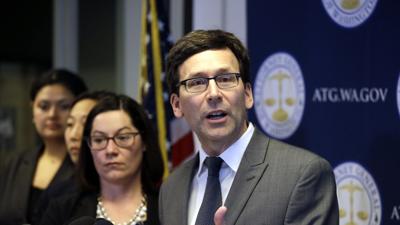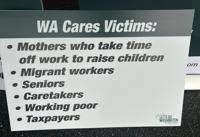(The Center Square) — Washington state's capital gains tax has been ruled unconstitutional. The state attorney general is petitioning the Washington Supreme Court to allow its collection anyway, pending appeal.
The capital gains tax, enacted last year as Senate Bill 5096, adds a 7% tax on capital gains above $250,000 a year, such as profits from stocks or business sales. Exceptions include the sale of real estate, livestock, and small family-owned businesses.
The constitutionality of the law was challenged in two lawsuits, later combined, in Douglas County Superior Court, where Judge Brian Huber ruled on March 1 that the tax is properly considered both a graduated tax and a property tax.
Income tax is prohibited by state law. Douglas ruled that, as a property tax, the law violates the state constitution which requires that property taxes be uniform and limited to 1%. The law is not uniform, Douglas ruled, because it does not apply to amounts less than $250,000.
Washington Attorney General Ferguson later asked the state Supreme Court to take the case on direct appeal. A hearing is set for Jan. 26.
Now Ferguson has asked the high court to stay the lower court’s ruling, which, he called “incorrect, and is at the very least debatable,” and argued that “It would be profoundly irresponsible for the Department to fail to prepare to collect the tax in April 2023 as directed by statute.”
Ferguson also argued that there is no harm to taxpayers in collecting the tax now because even if the lower court ruling is upheld, the state would return the money to taxpayers with interest.
Jason Mercier of the Washington Policy Institute believes this is an opportunity long sought by lawmakers to allow the court to create an income tax by judicial action.
“Lawmakers could have acknowledged from the beginning that the IRS and every other state in the country unequivocally say that a capital gains tax is an income tax,” Mercier said in a Nov. 4 statement. “Instead, they played word games although public records show that they wanted a lawsuit in the hopes the state Supreme Court would now by judicial fiat allow an income tax despite the voters rejecting six constitutional amendments.”
Mercier referred to a 2018 email from state Sen. Jamie Pedersen, D-43rd LD, in which he states, “But the more important benefit of passing a capital gains tax is on the legal side, from my perspective. The other side will challenge it as an unconstitutional property tax. This will give the Supreme Court the opportunity to revisit its bad decisions from 1934 and 1951 that income is property and will make it possible, if we succeed, to enact a progressive income tax with a simple majority vote.”
In 2018, the U.S. Department of the Treasury, in reply to a letter from Rep. Dan Newhouse, R-4th Dist., stated, “You ask whether tax on capital gains is considered an excise tax or an income tax? It is an income tax. More specifically, capital gains are treated as income under the tax code and taxed as such.”
Washington voters have rejected constitutional amendments allowing an income tax on six occasions, most recently in 2010.
Brett Davis contributed to this report.









